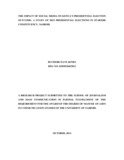| dc.description.abstract | Little is known in terms of the effect of the increased use of social media tools on
the election outcome. This study therefore sought to find out the effect of these social
media tools on the Presidential election results. The main objective of the study was to
establish the impact of social media on presidential elections. The specific objectives of
the study were to; establish the extent to which the electorate relies on social media in
making their election decisions; find out the benefits of social media as a tool of political
campaign; find out the impact of social media on presidential elections and finally to
establish how social media can be used effectively in future to yield positive results.
The location of this study was Starehe Constituency in Nairobi County, which
was chosen because it has higher internet and social media accessibility. The target
population was all the 138,630 registered voters in the constituency. The researcher used
mixed method approach (both quantitative and qualitative methods) to collect data. A
total of 190 questionnaires were distributed to respondents; 150 electorate of Starehe
Constituency, 20 politicians and 20 communication experts) and 164 questionnaires were
returned representing 86.3% response rate. The researcher also interviewed 10 key
informants (five political scientists and five IEBC officials) to collect qualitative data.
Quantitative data was analysed using the Statistical Package for the Social Sciences
(SPSS) version 17 while the qualitative data was analysed by obtaining detailed
information, then trying to establish patterns, trends and relationships from the
information gathered. Finally, the data was presented using tables, bar graphs, pie charts
and narratives.
According to the findings of the study, to some extent the electorate relied on
social media in making their election decisions. The study further established that for the
electorate the main reason or benefit for being on the social media was to get information
while for the politician it’s the presence of a ready audience to share information with.
The analysis of data also indicated that social media will continue being a reliable tool of
communication in future elections. It’s therefore recommended that politicians and
political parties embrace the social media as a tool of political campaign to reap its
benefits. | en_US |

